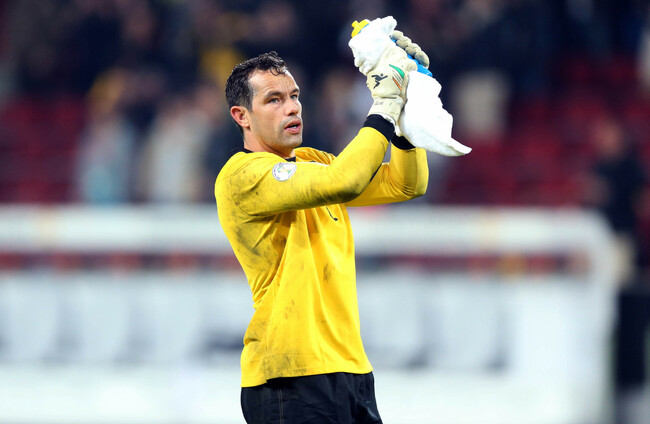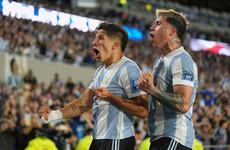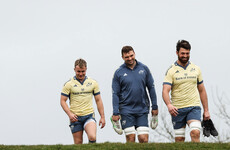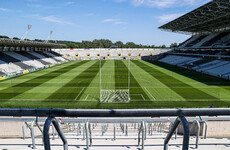WHEN ASKED if he misses football now, David Forde responds: “To be brutally honest, no.”
Sport at the top level is such an unforgiving and unstable environment.
“I always felt I was rescuing something,” Forde tells The 42.
“It’s only coming out of my career that I realised that I had a gift and an ability to play in the goals.
“But at the time, it just felt like I was pushing up mountains, and to get to that pinnacle, my dream was always to play for Ireland and play professionally in the UK.”
Beating himself up over losses and setbacks was the toughest aspect of being a professional footballer for Forde.
“And taking on too much accountability and responsibility, and ownership for those losses, that weren’t necessarily mine.”
As he matured, the Galway native gradually discovered how to cope better with disappointment.
“I learned how to regulate myself in a whole different space. And that was primarily because I took that upon myself to start to look into the mind. And I took that ownership of myself. And I said: ‘Right, I need to start exploring this because I can’t keep doing this to myself, I always felt whether it was getting abuse from fans, the press, the media, managers or players, that was the younger version of me.
“The older version, the mature side of myself was when I started to grab it in myself and started to realise that I’m my own greatest opponent, my own greatest obstacle, I’m just getting in my own way, because of the negative constructs of my mind and how I was viewing performance.”
And was there one particular incident that forced a change of outlook?
Forde says it was “a collection of stuff” and a long-lasting sense of simmering tension that eventually led to a crash.
After keeping 21 clean sheets in the Championship during a particularly productive 2009-10 season followed by 20 in the next campaign at Millwall, Forde was called up to the Ireland squad.
“Expectation levels had gone through the roof because now I was an international, earning more money, all those different things, all those extrinsic influences caused a lot of pressure and stress on myself,” he explains.
“And I just didn’t have anyone to work with or deal with that. I didn’t have anyone to share with that. I internalised and compartmentalised everything, even when I came home and I wasn’t right to do that to everyone, I wasn’t right to do that to myself, but I didn’t know any different. I didn’t know there were support mechanisms and people to alleviate those stressors and triggers.”
Forde ended up getting hurt before the international break playing on a pitch at Blackpool that “didn’t have a blade of grass on it”.
The goalkeeper still linked up with Ireland in the hope that the injury was not as bad as feared but had to withdraw from the squad ultimately.
“I felt sick to my stomach,” he recalls.
“I didn’t know how to deal with it because it was like: ‘We’re pushing to get to the Euros and what if I miss out, I lose my place at Millwall, lose my place with Ireland, everything that I’ve worked so hard to get, just how did I know all of a sudden I was losing grip and I had no control over it and it was a very scary space to be in.”
Forde watched from his sitting room as Ireland beat Estonia 4-0 in a playoff first leg to all but secure their place at Euro 2012.
Shay Given was the unquestioned number one but Forde was considered a valued squad member, with coach Giovanni Trapattoni inviting him to Dublin for the return leg to reassure him of his importance.
Millwall permitted the trip but wanted him back swiftly to continue treatment on Forde’s injury.
“I couldn’t really celebrate [Euros qualification] because I had a flight at 5am the next morning. So basically, I stayed up for the night, got back on the plane and was back for treatment. So I played the game on the Sunday.
“I probably shouldn’t have played, I forced it out of my desperation of losing my position and place.
“And my overactive mind was bringing me into all sorts of spirals and spaces. So I
kicked the ball. Next thing my quad went and I went: ‘Right, that’s not good.’ So the carrier had to carry me off the pitch.
“When it got scanned, they found that it was a grade three, it could be three months out. I thought: ‘Absolute disaster.’ And I just went into an absolute black hole.
“At that time, my sister was training to be a psychotherapist. And she had said to me: ‘You should look at speaking to someone.’
“I thought: ‘Jesus, that’s a bit far out there, that’s not for me.’ So I just left it and that kind of was the one thing [that changed my outlook].
“So I’m forever grateful to my sister, Edel — she sent me on that path. And it was a few weeks later that I decided to go and seek out some assistance.”
It was around this period too that Forde became interested in meditation.
“I said: ‘Do you know what? I need to do something here.’ Because I was basically losing my mind.
“Even though I’m six foot four, and I can hold a lot of space and, to be a goalkeeper, you have to be able to hold a lot of responsibility.
“And that was a big thing for me. I never showed any sign of weakness or any sign that I was struggling. Or that I was upset.
“I’d show my disappointment and my anger, but my anger was just another form of fear. So I was quite fearful at the time.”
Going back to his early days at Barry Town and West Ham, Forde had developed a keen interest in foreign cultures and would spend hours on the internet in what he describes as a “deep dive”.
The Aztecs, the Toltecs, the Native Americans, the Vedic people of India and Eastern philosophies were among his areas of investigation.
“Out of my isolation, boredom and homesickness, that was my channel of study in those cultures. So I always had a different understanding of trying to figure out what that sense of life is all about.
“So with that happening, I started to explore therapy. I started to explore talk therapy, I started exploring coaching, mentoring, and psychology.
“The best path that was right for me — and look, it’s not right for everyone, but it suited my nature and my personality — was meditation.
“And that was a huge tool for me, that allowed me to create space in my mind. It allowed me to silence my mind. And it allowed me to become still in my body.
“And it allowed my energy to get really focused and concentrated. But it allowed me also to go into deep states of contemplation that allowed me to look back into the past, and come up with the right outcome and solution, or look into the future and find out: ‘Right, this is the right path forward.’ Because my mind was overanalysing, overthinking and overcalculating, and in those spaces, that type of thinking was bringing me to the wrong conclusions and the wrong outcome.”
Forde felt this change of approach off the field helped him improve as a footballer, citing the fact that he was named Millwall’s Player of the Season for the 2013-14 campaign.
Having travelled to the 2012 Euros as the backup goalkeeper, following Shay Given’s retirement, in March 2013, he became Ireland’s oldest-ever competitive debutant at 33 when he lined out for a World Cup qualifier against Sweden, enjoying a spell as his country’s regular number one thereafter.
Meditation, in particular, proved a useful tool in dealing with the extremities of life in elite sport.
“As an athlete, I always felt that: ‘Jesus, I had so much energy, so much testosterone flowing through my body.’
“I was in the prime of my life, and just trying to channel that energy in the right way, and use it in the right way and then learn how to use the fluctuations of winning games, it was like an addiction and it’s a serious addiction.
“With the adrenaline after the win, Jesus I wouldn’t need an intoxicant because I was that high.
“And on the other side, when I was so low, I was lower than a snake’s belly. And that’s where that whole type of addictive energy started to come in. I was an absolute adrenaline junkie, behind it all.
“So meditation, pranayama — ancient breathing techniques taught me how to channel that energy, regulate it and use it in the healthiest of ways.”
Forde believes he always had a natural interest in these areas, tracing it back to his upbringing.
“I look back to as a young Catholic boy, going to mass and serving mass and all that kind of stuff. I always found great solace in prayer and my ancestors were big into prayer and rosaries and stuff, but I would have never taken it too seriously or fully understood it.
“I had a background and it wasn’t anything hardcore, but there was something there that I connected to that energy.”
Since retiring from playing, Forde has worked as head of psychology at Crystal Palace and in May 2021 was drafted into Stephen Kenny’s Ireland setup to care for players “having difficulty”.
“Where I was tapping into these many years ago, and being a trailblazer in that space, it was quite a scary space as well because I was like: ‘Jesus I’m viewing things and seeing things and doing things that are so alien — I’m meditating, pranayama, chanting, lighting incense and lads are looking at me thinking: ‘He’s absolutely off his nut.’ Now everybody’s f***ing at it and I’m like: ‘This is mental.’
“Everybody has a responsibility, first and foremost to themselves. And the best thing that I ever did was invest in myself. Because once I started investing in myself, then success and accomplishment came off the back of that. And reward came off the back of that.”
Forde now works at Pathfinder Coaching — an organisation he co-founded — which aims to “provide high-performance coaching and mentoring”. It is not restricted to sportspeople.
“The work I do know, I don’t tell people what to do,” he explains. “But I give them something to look at, a different way of looking at it, to whet their appetite and get their creative juices flowing.
“What their real self is, what that authentic self is in them. And it’s the same with footballers. I used to think I was just a footballer. I identified as just being a footballer, but I was more than that. I had so many other elements, hidden talents and abilities — so much other potential.
“Probably one of the biggest things that caused me so much torment as a young child was watching all my mates: Ryan Casey going to Swansea, Daragh Sheridan going to Aston Villa, Colin Hawkins going to Coventry, Tony Folan going to Crystal Palace, Rory Ginty going to Crystal Palace.
“Seeing so many lads from that generation, my generation, going to clubs. And yet I had that ability.
“People coming up to me, coaches, scouts and everyone else coming up to me saying: ‘Yeah, you’ve got a lot of potential, but…’
“And I used to sit there going: ‘That’s well and good saying that, but what actually is potential?’
“And so that’s what I do is realising that you can maximise your potential and that we’re more than what we believe ourselves to be.”
Forde lists the people who have influenced him greatly — including his mother (“the queen in my eyes”), his wife and family (“a huge inspiration”), Tony Burns at Millwall (“my surrogate father”), Giovanni Trapattoni (“a giant amongst men”), his youth coaches in Galway and his dad Patrick (“in some ways good, in some ways not”), who passed away in 2019.
“My father struggled with alcohol his whole life,” he explains. “And even though he was functional with that, my dad probably saw me play live in my whole career about four or five times.
“And even playing with Ireland, he never saw me play live. I think once maybe as a professional in England.
“There were huge parts in that, at that time in my life, when I did go through that breakdown with my quad and my mindset and all that kind of stuff, a lot of that debris I had to look at and work through.”
These days, Forde finds himself in the role of a parent watching on from the sidelines. Based in southeast London, his 12-year-old son plays at underage level for Bromley Town as a right wing-back.
After so many years of what he describes as suffering counteracted by highs, which he can “count on one hand,” Forde is now content looking on from a distance.
“Even watching Ireland, I can sit down and just watch a game like a fan again,” he says. “I don’t sit there and go: ‘Jeez, I wish I was out there.’
“Quite funnily after my last game, and I decided that’s me done, I got my last pair of gloves, my last pair of boots, and I put them into a container. And I set them alight.
“It was just a little ceremony, a rite of passage into my next stage of living.”

















Good luck to them both and I hope they enjoy and further their career
@Mark Smith: Really? I hope it goes terribly for them, they’re miserable there and then they retire in disgrace.
I’d say you actually mean Dave O’Callaghan there.
French rugby clearly more suited to Hart . Biarritz aren’t the club they used to be though .
@Limón Madrugada: if anything these boys will put them back on the right road, especially DOC
Both absolute gents
Hart was a disastrous signing for Munster, he hardly got a look in.
@Treaty Bhoy: ah, think it was more of a disaster for Hart. It’s not like Munster didnt have viable options.. get analysis as usual though
Really disappointed with Hart. I saw him a lot when he was in France and really thought he’d make the national squad when he moved to Munster. He’s a very French style 9. But he never kicked on, arguably went backwards. I wish them both luck.
@Ger: completely agree, I had hart down for an international squad player when he moved home and then he disappeared at Munster… strange one
@Ger: he didn’t really get a chance to be fair to him.